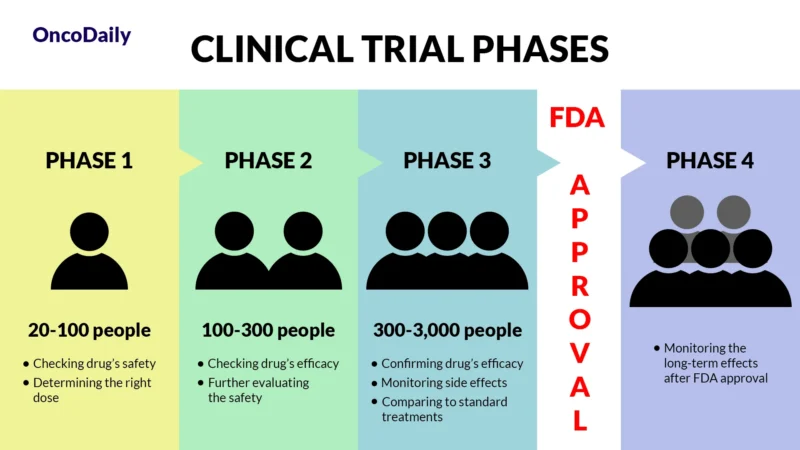Cancer treatment has advanced significantly, and one of the most promising breakthroughs is Trastuzumab deruxtecan. This innovative drug has received FDA approval for treating several cancers, including HER2-positive and HER2-low breast cancer, HER2-positive gastric cancer, and HER2-mutant lung cancer. It is redefining the way we treat HER2-driven cancers, offering hope for patients with limited treatment options.
What Is Trastuzumab deruxtecan, and How Does It Work?
Enhertu is an antibody-drug conjugate (ADC), meaning it combines a targeted antibody with a powerful chemotherapy drug. The antibody trastuzumab binds to the HER2 receptor, a protein that fuels the growth of certain cancers. Once inside the cancer cell, Enhertu releases deruxtecan, a potent chemotherapy agent that damages the tumor’s DNA and prevents it from growing. This precision-targeted approach helps minimize harm to healthy cells while effectively killing cancer cells.
One of Enhertu’s unique advantages is its “bystander effect”, which allows the drug to impact nearby cancer cells—even those with lower HER2 expression. This makes it an excellent option for treating both HER2-positive and HER2-low cancers.
What Is a Clinical Trial and Why Does It Matter?
A clinical trial is a research study designed to test new drugs and treatments in patients to determine their safety and effectiveness. Before Trastuzumab deruxtecan was approved, it went through multiple phases of clinical trials to assess how well it worked, what side effects it caused, and whether it was better than existing treatments. Clinical trials are essential because they provide scientific evidence that a drug can help patients while ensuring it is safe for widespread use.

What Does FDA Approval Mean?
When a drug receives FDA approval, it means that after rigorous testing in clinical trials, it has been shown to be both safe and effective for treating a specific condition. This approval makes the drug widely available for doctors to prescribe and helps patients access new, cutting-edge treatments sooner.
What Cancers Does Trastuzumab deruxtecan Treat?
Trastuzumab deruxtecan is a targeted therapy that’s helping people with certain types of cancer, including breast, gastric, and lung cancer, by focusing on cancer cells that express a protein called HER2. This protein can cause some cancers to grow faster, but Enhertu is designed to target and attack these cells, offering a treatment option while sparing healthy ones.
For HER2-positive breast cancer, which is breast cancer that has spread to other parts of the body (metastatic), Enhertu is used when previous HER2-targeted treatments haven’t worked. The DESTINY-Breast01 trial showed trastuzumab deruxtecan’s effectiveness for this group, offering new hope for patients whose cancer continued to progress after other therapies.
Enhertu is also approved for HER2-low breast cancer, the first-ever HER2-targeted therapy for cancers with low levels of HER2 expression (classified as IHC 1+ or IHC 2+/ISH-). This breakthrough is based on results from the DESTINY-Breast04 trial, which showed that Enhertu can offer a new treatment option for patients who were previously underserved by other therapies.
For patients with HER2-positive gastric (stomach) cancer or gastroesophageal junction (GEJ) cancer, Trastuzumab deruxtecan is approved for use when the cancer has spread and previous treatment with trastuzumab (another HER2-targeted therapy) is no longer effective. This approval came after encouraging results from the DESTINY-Gastric01 trial, which demonstrated the benefits of Enhertu for people with metastatic HER2-positive gastric cancer.
Finally, Trastuzumab deruxtecan is approved for HER2-mutant non-small cell lung cancer (NSCLC) in patients who have received prior treatments. The DESTINY-Lung02 trial showed that Enhertu could be a promising option for people with HER2 mutations in their lung cancer, offering a potential new treatment when other options have been exhausted.
Each of these trials has helped expand the number of cancers that Trastuzumab deruxtecan can treat, making it a powerful tool in the fight against HER2-driven cancers. As more research is conducted, Enhertu may become an option for even more patients. If someone has been diagnosed with a HER2-positive, HER2-low, or HER2-mutant cancer, it’s worth discussing with an oncologist whether Trastuzumab deruxtecan could be part of their treatment plan.

Learn more about Breast Cancer: Symptoms Causes, Stages, Diagnosis and Treatment on OncoDaily.
How Effective Is Trastuzumab Deruxtecan? Results from Clinical Trials
Trastuzumab deruxtecan is a targeted cancer therapy that’s shown remarkable results in clinical trials. These trials, which test new treatments in real patients, have helped doctors understand how well Enhertu works across several different types of cancer—especially for patients who had few other options.
One of the most important studies was the DESTINY-Breast01 trial, which focused on people with HER2-positive breast cancer. These were patients who had already tried other treatments that didn’t work. In this study, about 60.9% of patients responded to Enhertu, meaning their tumors shrank or stopped growing. On average, their cancer didn’t worsen for 16.4 months—an impressive result for people with advanced disease.
Another major study, the DESTINY-Gastric01 trial, looked at HER2-positive stomach cancer. This trial showed that 51% of patients responded to Enhertu, compared to just 14% who responded to standard chemotherapy. Not only that, but patients treated with Enhertu lived longer—about 12.5 months on average, compared to 8.4 months for those receiving regular chemotherapy.
Enhertu has also shown benefits for a different group of patients: those with HER2-low breast cancer. In the DESTINY-Breast04 trial, Enhertu helped people live longer without their cancer worsening—an average of 10.1 months, compared to 5.4 months with standard treatments. Overall survival was also better, with patients living an average of 23.9 months on trastuzumab deruxtecan, versus 17.5 months with other therapies. This was a groundbreaking finding because HER2-low patients previously didn’t have effective targeted treatment options.
In lung cancer, the DESTINY-Lung02 trial studied patients with HER2-mutant non-small cell lung cancer, a rare and difficult-to-treat form of the disease. Enhertu worked well here too. About 49% of patients responded to a 5.4 mg/kg dose, and 56% responded to a slightly higher dose of 6.4 mg/kg. Even more encouraging, the effects of the treatment lasted quite a long time—on average, the response lasted 16.8 months.
Taken together, these clinical trials show that Enhertu significantly improves both survival and response rates in several types of cancer, including breast, stomach, and lung cancers. It’s especially encouraging for patients who had limited treatment options in the past. While every person’s situation is different, these results give real hope and have already changed the way doctors treat certain cancers. If you’re considering Enhertu, speak with your oncologist about whether it’s a good fit for your type of cancer and treatment history.

Learn more about Stomach Cancer: Symptoms and Causes, Types, Diagnosis and Treatment on OncoDaily.
What are the Side Effects of Trastuzumab deruxtecan?
Enhertu is a highly effective treatment for HER2-positive cancers, but like all medications, it may come with potential side effects. While many patients tolerate it well, it’s important to be aware of both common and more serious side effects that may occur.
One of the most common side effects of Enhertu is nausea and vomiting. These can usually be managed with anti-nausea medications prescribed by a doctor. Another common issue is fatigue, which can make patients feel very tired. It’s important to balance activity with rest to avoid overexertion. Low blood counts, including neutropenia (low white blood cells) and anemia (low red blood cells), can also occur, which may require regular blood tests and supportive therapy to maintain healthy levels. Hair loss is another side effect, as it is common with chemotherapy treatments, but hair typically grows back after treatment ends.
In addition to these more common effects, there are some serious but less common side effects that patients should be aware of. One of the most serious is interstitial lung disease (ILD), which can cause symptoms like a cough, shortness of breath, and fever. If these symptoms occur, immediate medical attention is necessary. Enhertu can also cause heart problems, particularly affecting the left ventricle of the heart, which requires regular heart monitoring to ensure proper function. Lastly, infusion reactions are possible, where patients may experience fever, chills, or allergic reactions during or shortly after the infusion.

Recommended Dosage of Trastuzumab deruxtecan
The dosage of Enhertu depends on the type of cancer being treated. For HER2-positive breast cancer, HER2-low breast cancer, and HER2-mutant non-small cell lung cancer (NSCLC), the recommended dose is 5.4 mg/kg administered through an intravenous (IV) infusion every three weeks. For gastric or gastroesophageal junction (GEJ) cancer, the recommended dose is 6.4 mg/kg every three weeks. For other solid tumors with HER2 expression, the recommended dose is 5.4 mg/kg every three weeks.
Enhertu is given as an IV infusion. On the first dose, it is infused over 90 minutes. If the patient tolerates it well, subsequent doses can be administered over a shorter period of 30 minutes.
What to Avoid During Trastuzumab deruxtecan Treatment
Patients receiving Enhertu should take certain precautions to stay safe and help the treatment work as effectively as possible.
One of the most important considerations is pregnancy. Enhertu may harm an unborn baby, so preventing pregnancy during treatment is essential. Women who are receiving Enhertu are advised to use reliable birth control during the course of treatment and for at least seven months after the final dose. Men whose partners can become pregnant should also use effective contraception during treatment and for four months afterward. Breastfeeding is not recommended while receiving Enhertu and for at least one week after the last dose, as the drug may pass into breast milk and potentially harm a nursing infant.
Because Enhertu can weaken the immune system, patients are also advised to avoid live vaccines during treatment. This includes vaccines for measles, mumps, rubella, and yellow fever. These types of vaccines contain live viruses and may increase the risk of infection in people with reduced immunity. Safer, non-live alternatives may be available, so vaccination should always be discussed with a healthcare provider.
Patients should also be cautious about medication interactions. Certain medications—including some antibiotics, antifungal agents, and drugs that affect liver enzymes (known as CYP3A inhibitors or inducers)—can interfere with Enhertu’s effectiveness. Even over-the-counter medicines, herbal supplements, or vitamins might pose a risk. Therefore, it is essential to consult a doctor before starting any new medication or supplement during treatment. Enhertu may cause fatigue, dizziness, or difficulty concentrating in some patients. Because of this, it is recommended to avoid driving or operating heavy machinery until it becomes clear how the medication affects the individual. Safety should always come first, especially when experiencing these side effects.
By following these precautions and staying in close contact with their healthcare team, patients can help ensure that their Enhertu treatment is as safe and effective as possible. Any questions or concerns should always be shared with a doctor or nurse, who can provide personalized guidance and support.
Will Trastuzumab deruxtecan Stay Effective Over Time?
Like all cancer treatments, Enhertu’s effectiveness may decrease over time due to resistance mechanisms such as HER2 loss or DNA repair alterations. If resistance occurs, oncologists may adjust the treatment or explore combination therapies and clinical trials.
Ongoing Research and Future Directions
Trastuzumab deruxtecan has already shown impressive results in treating certain types of HER2-positive and HER2-low cancers. However, its story is still unfolding. Researchers around the world are actively studying this drug in clinical trials to explore new ways it can be used to help even more patients.
One such study is the DESTINY-Ovarian01 trial, which is investigating the use of Enhertu combined with bevacizumab in patients with HER2-expressing ovarian cancer. This research aims to determine whether the combination could become a new treatment option for this challenging disease. In the DESTINY-Gastric05 trial, Enhertu is being studied as a first-line treatment—meaning as the initial therapy—for patients with HER2-positive gastric cancer. In this trial, Enhertu is combined with chemotherapy and pembrolizumab, an immunotherapy drug, to see if this approach can offer better outcomes compared to current standard treatments.
The DISCORDANT trial focuses on patients with HER2-low metastatic breast cancer, comparing Enhertu to commonly used treatments such as CDK4/6 inhibitors. The goal is to find out which treatment strategy provides the most benefit for these patients. Another ongoing study, known as NCT06364410, is evaluating Enhertu in combination with a Wee1 inhibitor, a newer type of targeted therapy. This trial includes patients with HER2-positive gastric cancer as well as other solid tumors and may help expand the use of Enhertu into more cancer types in the future.
These clinical trials reflect the growing interest in Enhertu and its potential across a wide range of cancers. With its strong track record in earlier studies and its expanding role in cancer care, Enhertu represents a significant advancement in oncology.
What does it mean when the same drug is used for different types of cancer?
A drug used for different cancers means it targets a common feature, like a specific molecular marker, that is shared across various types of tumors. This approach allows a single drug to be effective against multiple cancers with similar characteristics, regardless of their location in the body.
In 2024, AstraZeneca announced that Enhertu (Trastuzumab deruxtecan) was approved by the FDA to treat adults with advanced HER2-positive cancers that haven’t responded to other treatments. This approval follows promising results from trials showing that Enhertu was effective across several types of cancer. As the first drug of its kind, Enhertu can now be used for cancers with high HER2 levels, such as breast, lung, and colorectal cancers. This approval marks a shift toward treating cancer based on its unique characteristics rather than its location.
If you’re a healthcare provider, access the professional version here.


